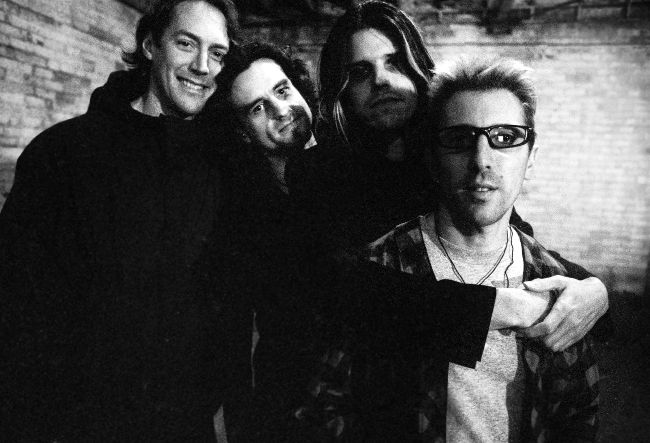Lateralus Thinking
As Tool’s chart-topping, genre-reviving third album turns 20, bassist Justin Chancellor takes Prog inside the band’s creative process to hear about why he loves uncomfortable rhythms, the pressure of writing the follow-up to Ænima, and the long struggle to bring Lateralus to life.
Words: David West Portraits: Scarlet Page. Illustrations: Alex Grey

Tool, L-R: Danny Carey, Justin Chancellor, Adam Jones, Maynard James Keenan.
The 1990s were not kind to progressive rock. Grunge had made virtuosity unfashionable, boy bands were all the rage, and hip hop was inexorably pushing rock out of the limelight.Legacy bands like Pink Floyd and Rush could still crack the charts, but they were lonely torchbearers for a genre that seemed to exist in its own hermetic world, incapable or perhaps disinterested in penetrating the mainstream. It was against this unpromising backdrop that Tool crafted their most ambitious and unashamedly progressive album to date. Released on May 15, 2001, Lateralus hit No.1 on the Billboard 200 album chart and went on to outsell the likes of Jay-Z, Eminem and Madonna for the year. And it did all this despite being darker, stranger and weirder than the band’s previous albums, taking them from the alternative metal of Undertow and Ænima into the realm of progressive rock.
“It was a learning curve, that whole experience,” says Justin Chancellor. The British bassist had joined Tool – guitarist Adam Jones, drummer Danny Carey and frontman Maynard James Keenan – when they’d already started work on 1996’s Ænima, following the departure of Paul D’Amour. It was a major step-up in scale from his previous band, Peach, back in London. “As far as success and all that stuff, being in this band, it wasn’t like joining Whitesnake or Poison or something where it’s like groupies and crazy drug binges,” says Chancellor. “These are real, hardworking musicians. Our backstage is really quite pleasant and calm, almost school-like. That’s good because it keeps you really focused on what you’re doing.” And Tool is a very democratic band, where every member has an equal voice. “They are surrounded by some really excellent creative people who are all really encouraging. It was very tough to be keeping my head together for the first few years, but they totally made it fine, saying, ‘You’re one of us.’” But that status brings its own responsibilities. “Being an equal member of a band like Tool requires that you put in an equal share so that you don’t drag the boat down, that’s a pressure in itself. That’s a built-in way of us all keeping an eye on each other – no one can really lag.”

*QUOTE FROM REVOLVER, AUGUST 28, 2019
“It wasn’t like joining Whitesnake or Poison or something where it’s like groupies and crazy drug binges. These are real, hardworking musicians.”
The Long Shadow Of Lateralus
Brann Dailor, Mastodon*
“There’s so much complexity to the music and to the lyrics, and a lot of the lyrics are satirising or making fun of the people that are in the audience, unbeknownst to them. So it’s quite puzzling [how they appeal to such a wide audience] but I think that there is definitely a prog element to them that we picked up on. And I think maybe how you present yourself aesthetically, reaching for the combination of visual art with music, I think that they’ve been a huge influence on us: just to try to be more thoughtful in your whole approach to writing and recording music in general. I think that they’re a very thoughtful group of artists, and I think that they put a lot of time and effort into every single facet of their band, which is just appreciated.”
DW
Coming aboard during the writing for Ænima was a baptism by fire. “It was a very new experience for the entire band,” says Chancellor. “We went on a really big tour, then we did a secondary tour for the best part of two years. By the end of it, I think everybody needed a little breathing room from each other. We took a pretty decent break. Maynard had some aspirations to pursue some other areas of music with his other mates, so at first, for me being new in the band, I was perplexed – aren’t we going to make a new album? Aren’t we going to carry on now on the back of this success? But obviously they’d been together a little longer and they’d already been through some ups and downs with having a new member in the band. After that tour for Ænima, everyone was quite happy to slow down a bit.” Well, almost everyone. “Maynard calls himself a worldwide multitasker and I think that’s in his nature. He was never going to slow down.”
Keenan was already working on music for what became A Perfect Circle with guitarist Billy Howerdel, who was living in the singer’s house in North Hollywood. Their debut album, Mer De Noms, came out in May 2000, but they were already on tour opening for Nine Inch Nails from April. That ran into the summer, before A Perfect Circle began a run of their own headline shows in July through to September. Then in 2001 they went out again, from the end of January through March, so, while Keenan was occupied with all that, Chancellor, Jones and Carey set about creating new music for Tool.
“We started to put some stuff together thinking maybe it would pull together quite quickly, we could get some solid forms of songs together, but it was really hard,” says Chancellor. “[With] Ænima, four songs were written when I joined, so you’ve got a chunk of something there already and we just built on that and added to it with my contribution being amalgamated into that. Starting this new project was literally like: ‘All right, we’ve got to write a whole album now with me, a whole new setup,’ so it was tough. We struggled to get anything solidified and by the time we had a few basic ideas, Maynard was ready to go with his other band, so we all said, ‘All right, that’s the way it’s going to be.’ It turned out that it gave us that breathing room. He went off, we all got to knuckle down and really be quite self-indulgent in a way, but we needed to look at what we were going to do, the three of us… musically, we needed to explore a bit.”